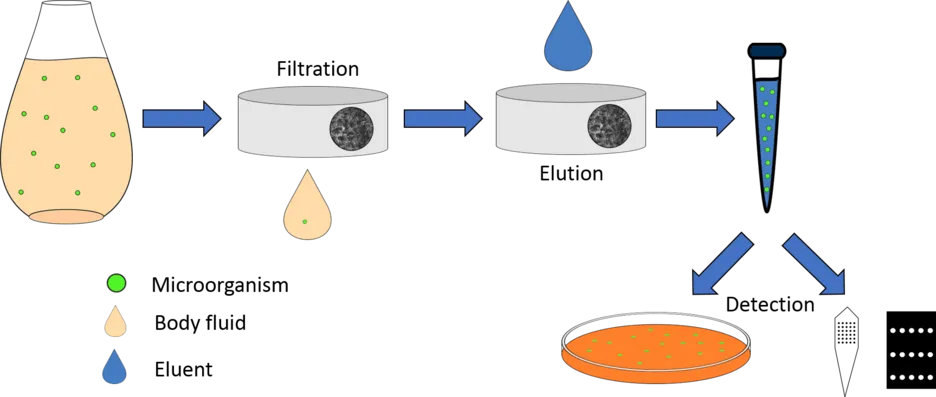Rapid Enrichment for Early and Highly Sensitive Pathogen Detection in Human Body Fluids with Monolithic Affinity Filtration
OBJECTIVE
One of the most fatal consequences of liver diseases, like liver cirrhosis, is the formation of an abnormal amount of abdominal fluid, also called ascites. An infection of this fluid is mostly caused by gram-positive and gram-negative bacteria like Escherichia coli and Enterococcus faecalis, but also fungi like Candida. Patient mortality depends on the time until treatment is effective. For this, the causing pathogens and their potential antimicrobial resistances need to be detected as fast as possible. The current gold standard, culture, takes several days due to the low concentration of bacteria and sometimes even leads to false negative results. Within the REP-MAF project we aim to develop an enrichment method for these pathogens in ascites, based on monolithic affinity filtration. The objectives of our institute are:
- Development of a 2D test platform for the fluorescence-based detection system of our
project partners (Klinikum Rechts der Isar) for prior testing of contemplable affinity ligands
- Development of an automated filtration set-up for filtration of ascites followed by elution
- Establishment of a DNA microarray test for detection of the relevant pathogens and their
antibiotic resistances
METHODS
1. For the monolithic affinity filtration different affinity ligands are tested on a 2D system and afterwards are
applied on the monolithic system. A protocol for the filtration of 1,5-2 L of ascites is developed.
Pathogens will be analyzed using culture and DNA- based assays.
2. A heterogeneous asymmetric recombinase polymerase amplification (haRPA) will be developed for the fungus
Candida albicans. Furthermore, the antibiotic resistances of the bacteria will be analyzed using haRPA.
3. For the application of the filtration in hospitals, an automated filtration and elution system is developed and built.

INVOLVED PHD STUDENTS
M. Sc. Julia Neumair
M. Sc. Katharina Sollweck
PARTNERS
Klinikum Rechts der Isar, Technische Universität München
FINANCIAL SUPPORT
Deutsche Forschungsgemeinschaft (DFG) through TUM International Graduate School of Science and Engineering (IGSSE), GSC 81